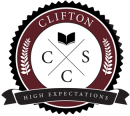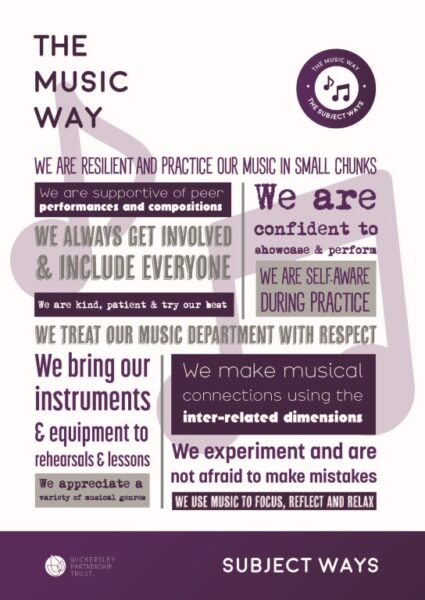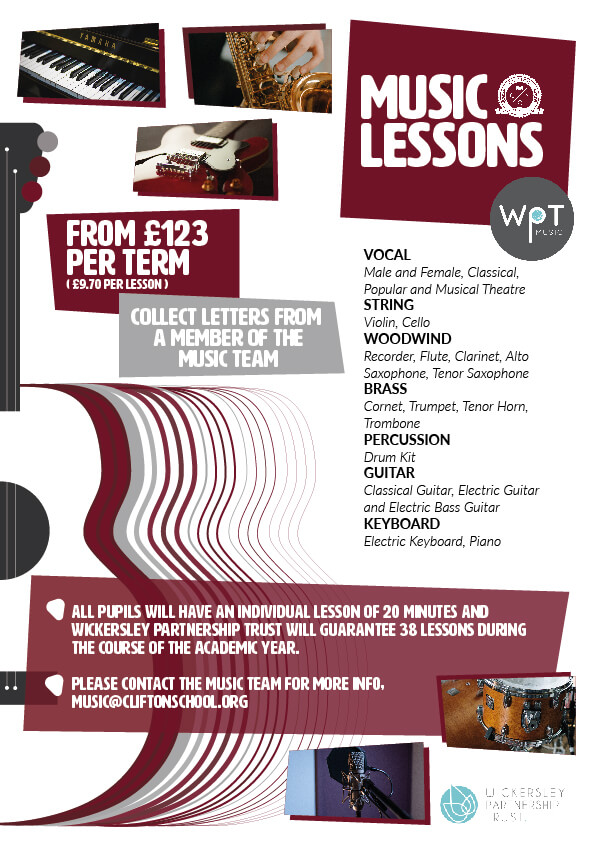Curriculum
Music
The Subject Way
Firstly, to teach students the vital skills they need to achieve their full potential and gain the very best grades they can. Secondly, to teach students how each subject relates to the wider world, incorporating the life skills they will learn.
It is our belief that knowing how what you learn links to the wider world brings a subject to life and therefore improves overall understanding and engagement.
Curriculum Intent
At Wickersley Partnership Trust, we aim to provide an exciting, relevant and inclusive curriculum where students can learn to be creative, confident and skilful performers. Through the delivery of a broad variety of topics, our students become experienced and passionate practitioners who have a clear love for music.
We would like our students to gain a wider knowledge and understanding of music both practically and theoretically and to develop a wide range of skills that are used in the industry.
In Music the goal is to inspire and engage students to develop a love of music and develop their talents through participation in a wide range of instrumental and practical skills. Through learning music, students increase their self confidence, creativity and a sense of achievement.
We aim to engender a love of learning, self-belief and aspiration through 4 key intentions:
- The removal of barriers to learning
- Developing skills for learning
- Developing personal attributes
- Enriching student experiences and broadening their horizons
Our curriculum is not driven by performance tables. It is our belief that a strong, broad, balanced curriculum, tailored to individual needs can remove barriers to learning and allow all students to access the curriculum appropriate to them and will therefore meet their individual needs.
INTENTION 1 – The removal of barriers to learning
We want all our students to go out into the world, and become successful, happy, fulfilled adults who will be good citizens and make a positive contribution to society. The acquisition of basic skills is either at the heart of achieving this or a barrier to learning and prevents students from fully flourishing. Four common barriers, if left unchallenged, will limit the progress, engagement and development of students who access our curriculum.
They are:
- Literacy
- Numeracy
- Oracy
- Vocabulary
We see these barriers as a high priority for the school. In Music, we help remove barriers to literacy by developing essay writing skills and increase students’ understanding of how to research effectively. We use regular recall and listening activities in which students assess their understanding and application of Tier 3 vocabulary. Students have the opportunity to read and analyse lyrics which helps in widening their vocabulary. We broaden their knowledge of the discipline through subject-specific terminology, which is used frequently and consistently across practical and coursework based lessons when giving answers and feedback. In addition, retention is assessed through regular low-stakes testing during starter activities.
We allow ample opportunities for group discussions in lessons around specific topics and promote creative collaboration where possible when producing a piece of work. Example techniques to support students’ oracy include Think, Pair, Share, planned questioning, question matrices and modelling.
INTENTION 2 – Developing skills for learning
In Music, we develop skills for learning by encouraging consistent use of subject specific keywords and development of correct and relevant terminology. Our curriculum is designed to allow students to advance in topic based skills throughout each year of study and revisit important terminology through constant recall. We provide opportunities to improve memory through learning lyrics or chords/notes off by heart in order to move their focus away from sheets and more towards specific performance skills.
We offer discussions around differences in opinion and respect others views and subjective tastes when looking at different cultured pieces of music. We help students get a better understanding of the lyrics and the emotion behind specific vocabulary that is used. Being creative is a key component of our subject and we encourage this through composing and writing music and creating different performances. We analyse and listen to different styles of music. We have multiple opportunities to review and reflect on performances and student work allowing for constructive feedback of themselves and their peers.
INTENTION 3 – Fostering personal attributes
Our Music curriculum promotes the skills and attributes our students need in order to develop the independence, responsibility, accountability and resilience they need to have a happy and successful life. We refer to this crucial aspect of our curriculum intent as the Music Way and it is embedded in everything we do.
It is the language that we speak and key aspects of the Music Way are as follows:
- We treat our music department with respect
- Practice makes perfect
- We listen to others
- We do not judge
- We are honest
- We are kind, patient and try our best
- We are resilient
- We support each other
- We always get involved and include everyone
- We make the most of the opportunities given to us
- We are all musicians
- We are not afraid to make mistakes
- We are not afraid to try things differently
- We are willing to try new things
- We keep going
In Music, we foster personal attributes by promoting independence through solo rehearsal and encouraging self-motivation to progress. We enable students to overcome difficulties in musical technique and deal with performance anxiety when performing in front of an audience. We help promote a growth mindset and show how mistakes are an important part of learning. From this, we demonstrate how to bounce back from a disappointing performance.
We encourage all forms of communication and understanding of emotions and expression especially with peers, themselves and their audience. Collaboration with peers and in groups allows for opportunities to work with students outside their usual friendship groups and other year groups. This includes working on the many extra-curricular school productions/shows delivered. All participants are ambassadors for the school and take huge pride in being part of the school community. We have high expectations in lessons that are followed to help students grow in terms of performance and self progression. From this, there is mutual respect for both peers and staff.
INTENTION 4 – Enriching student experiences and broadening their horizons
Our intent is that all students have a full understanding of how to develop themselves as well rounded citizens, maintain healthy relationships and understand how to keep themselves safe both online and in their day-to-day life. We want all students to know what options are open to them in the future and understand the routes they have in order to progress on their life journey. Our curriculum will include:
- A variety of trips to local colleges, theatres and music venues
- Visits from industry professionals that lead on subject-specific workshops
- The use of regular performance in lessons to increase confidence and decrease performance anxiety
- Extracurricular enrichment through school shows/concerts, choir, music technology and instrumental development
- Students demonstrating excellent attitudes to their learning are rewarded by inclusion on the Musicians Board. Students who show admirable commitment to their development as musicians become Music Leaders who support and mentor younger pupils.
Curriculum
Key Stage 3
Year-by-Year Subject Breakdown
- Topic 1 – Rhythm and Pulse
- Topic 2 – Keyboard Skills
- Topic 3 – Music and Advertising
- Topic 4 – Reggae
- Topic 5 – Ukulele
- Topic 6 – Band Skills
- Topic 1- In the Hall of the Mountain King
- Topic 2 – Film Music
- Topic 3 – Samba
- Topic 4 – EDM
- Topic 5 – Blues
- Topic 6 – Band Skills
- Unit 1: 50’s, 60’s Rock n Roll
- Unit 2: 70’s Disco
- Unit 3: 80’s Synth Pop
- Unit 4: 90’s Alt Rock
- Unit 5: 00’s
- Unit 6: 2010
Students who opt to study Music at KS4 have two lessons per week via the Eduqas GCSE course.
Key Stage 4
GCSE music encourages an integrated approach to the three distinct disciplines of performing, composing and appraising through four interrelated areas of study. The four areas of study are designed to develop knowledge and understanding of music through the study of a variety of genres and styles in a wider context. The Western Classical Tradition forms the basis of Musical Forms and Devices (area of study 1), and learners should take the opportunity to explore these forms and devices further in the other three areas of study. Music for Ensemble (area of study 2) allows learners to look more closely at texture and sonority. Film Music (area of study 3) and Popular Music (area of study 4) provide an opportunity to look at contrasting styles and genres of music.
Year-by-Year Subject Breakdown
Half Term 1
Area of study 4: Popular music and introduction to set work ‘Africa’ by Toto
Component 1 – Performance Skills
Half Term 2
Area of Study 2 : Music for Ensemble
(Jazz / Chamber Music / Musical Theatre)
Component 2 – Composition Skills
Half Term 3
Area of Study 1 : Musical Forms and Devices and introduction to set work ‘Badinerie’ by Bach
Component 2 – Composition Skills
Half Term 4
Area of Study 3: Film Music I
Component 2 – Composition Skills
Half Term 5
Area of Study 2 : Music for Ensemble I
(Jazz / Chamber Music / Musical Theatre)
Component 2 – Composition Skills
Half Term 6
Preparation/Revision for end of year mock listening and appraising
Component 1 – Performance Skills Component 2 – Composition Skills Non-Assessed Composition.
Non-Assessed Composition
Half Term 1
Area of Study 1 : Musical Forms and Devices II
Component 2 – One free composition and one set brief
Half Term 2
Area of Study 4 : Popular Music II
Component 2 – One free composition and one set brief
Half Term 3
Area of Study 2 : Music for Ensemble II
(Jazz / Chamber Music / Musical Theatre)
Component 2 – One free composition and one set brief
Half Term 4
Area of Study 3 : Film Music 2
Half Term 5
PREPARATION / REVISION MATERIALS FOR ALL AREAS OF STUDY AND SET WORKS FOR YEAR 11 LISTENING EXAM
Key Stage 4 as of 2025
BTEC Tech Award Music 2022
Year-by-Year Subject Breakdown
| Term | Big ideas / topics | Key knowledge |
|---|---|---|
| Term 1 | Introduction to course Performance skills Composition skills Listening skills | Performance skills and band skills Composition skills such as harmony, melody writing The musical elements |
| Term 2 | Start Component 1 – Exploring Music Products and Styles | Use of musical elements and musical features of Britpop Use of musical elements and musical features of Reggae Use of musical elements and musical features of Rock ’n’ Roll |
| Term 3 | Component 1 – Exploring Music Products and Styles | Use of musical elements and musical features of Film Music Use of musical elements and musical features of African drumming Music industry products and realisation techniques |
| Term 4 | Component 1 Assessment | Complete portfolio for Component 1 under controlled assessment conditions (12 lessons) |
| Term 5 | Start Component 2 – Music Skills Development | Professional skills in the music industry Planning and communicating music skills |
| Term 6 | Component 2 – Music Skills Development | Workshop in performance skills Workshop in creating original music Workshop in music production |
| Term | Big ideas / topics | Key knowledge |
|---|---|---|
| Term 1 | Component 2 | Recap: professional skills in the music industryRecap planning and communicating music skillsPerformance skillsComposition skills |
| Term 2 | Component 2 Assessment | Complete portfolio for Component 2 under controlled conditions (15 lessons) |
| Term 3 | Start Component 3 | Understand how to respond to a music briefSelect and apply skills in response to a music brief |
| Term 4 | Component 3 | How to present a final product for a music briefComment on the creative process and outcome |
| Term 5 | Component 3 Assessment | Complete portfolio for Component 3 in controlled conditions (23 lessons) |
| Term 6 | Examinations |
Subkect Director
S Bingham
- sbingham@wickersley.net
Find out more
If you would like more information about our curriculum, please contact Mrs Smith, Headteacher using the details on our contact page.





